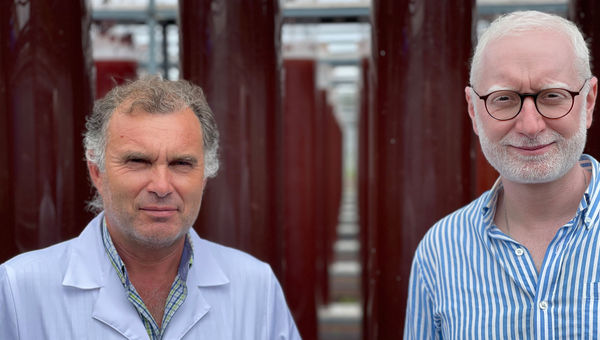
Arnie Weissmann
Last week I was in Portugal and the Azores and found several things that reflect my interests: A Mozambiquan restaurant in Lisbon; a tour of Azores Wine Co., operating in a 500-year-old vineyard -- now a Unesco World Heritage Site -- on the island of Pico; and on Sao Miguel Island, hot springs and whale-watching.
But in travel as in life, there are the things you choose, and the things that choose you.
On my last day, I was in Ponta Delgada, the capital of the Azores. I had a few hours to kill before my flight home, but there was nothing among the typically recommended activities that sounded particularly appealing.
I had met Luis Capdeville Botelho, the chief executive of the Azores Tourism Association, so I asked him for his recommendation. "There is a health supplement that's made from something found in the Azores," he said. "You can visit where it's manufactured."
This struck me as perhaps the most atypical suggestion from a tourism board chief that I have heard in 20 years as editor in chief of Travel Weekly. To be fair, I had told him I like off-the-beaten-path, nontouristy options. He Whats-Apped me their marketing brochure and personally made arrangements for my visit. I admit that I wondered for a moment if perhaps it was owned by a relative of his or even if he were an investor.
When the appointed hour arrived, my taxi pulled into an industrial park off a highway, about 10 minutes outside of town. If an online dictionary needed a photo to illustrate the definition of "generic," this site might do the trick. The taxi driver asked a maintenance worker we saw if he knew where the company was located; the answer was a blank stare.
But 100 yards in, we saw signage -- nice signage -- indicating we had reached the headquarters of Algicel. I asked the driver to pick me up in an hour and went in.

Luis Teves, co-founder of Algicel, with Goncalo Teixeira da Mota, managing partner, in Algicel's field of bioreactors, each one incubating microalgae to produce astaxanthin. Photo Credit: TW photo by Arnie Weissmann
As I waited in a reception building, I began to read the first in a series of graphic posters decorating three walls of the room. They explained, in Portuguese and English, what exactly this company produced, its significance and a bit about the process. A few minutes later, Goncalo Teixeira da Mota, managing partner of Algicel, and co-founder Luis Teves appeared and guided me through the posters, providing commentary and answering questions.
Although the supplement industry, unregulated in the U.S., rightfully invites skeptical appraisal, it became clear that this was both a serious scientific as well as a serious commercial effort. It had partnerships with a university and financial support from the EU. It produces a powerful antioxidant from the microalgae astaxanthin, which is found on the island in abundance and is packaged and sold by Algicel as Azora.
Teixeira and Teves freely admit astaxanthin is also found and commercially produced elsewhere. They had considered using a strain from Texas but concluded the local version was more effective.
I am not in a position to evaluate its medical claims but have to say I was very happy to have spent an hour at the facility. In fact, at the 35-minute mark, I regretted telling the taxi driver to be back in only an hour. There was an aspect of being in a mad scientist's lab: 4,000 bubbling bioreactors were producing the stuff, each filled with either green or dark-red liquid. Behind the building were acres of clear-glass incubating cylinders, each taller than me or my hosts. And, after my orientation, I even knew why some were green and some were red.
It brought me back to childhood factory tours I had taken of Sealtest ice cream in Chicago and of Kellogg's in Battle Creek, Mich. But even though I enjoyed the samples at the end of the Sealtest tour more than I expect I'll enjoy swallowing the sample pills they gave me, I was glad to have taken the tour. I learned a fair amount about antioxidants, the evolution of certain single-cell microalgae (I took the opportunity to view them under a microscope) and hear an inspiring story about an enterprise that finally began operations in 2020 after 14 years of research and development, only to learn it was allowed to work just in fits and starts between pandemic-related lockdowns and openings.
I don't think I enjoyed the tour only because, after a year at home, I would find even sloth racing interesting. The founders of Algicel intuit they have a compelling narrative and opened a Microalgae Interpretation Center (tours by appointment; phone +351 961 445 805).
I'm not sure which subcategory of travel this tour falls under -- medical tourism? -- but it satisfied, for me, the most fundamental travel motive of all: curiosity. I wonder, as travel reopens, whether the possibilities of what can be categorized as "tourism" may broaden for others, as well.